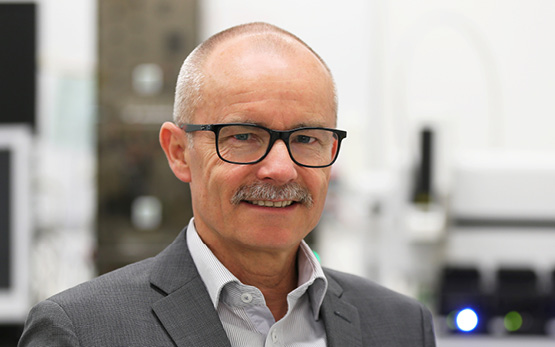Languages have never been his thing, says Robert Baur (b. 1958) in a light dialect that even after more than 20 years in Richterswil on Lake Zurich is still highly inflected with the sounds of his native Schaffhausen. “In my youth, my interests lay primarily in sport, especially in gymnastics” he confides. He would love to be young again, since he’s fascinated by the way physics is almost suspended in sport nowadays. At one time he seriously considered becoming a gym teacher, but an injury led him to the decision to study biology after all. “And to this day” he says, “I’ve never regretted that decision.”
Robert Baur grew up in Rafz in the canton of Zurich, just a stone’s throw from the German border. The peripheral location leaves its mark on people, Baur feels – “Perhaps it’s precisely for this reason that the idyll is cultivated to such an extent.” His father worked as a technical draughtsman in a local business, his mother took care of the household. That Robert, the oldest of four children, was also the only one to go to university is probably due in large part to his primary-school teacher. He convinced Mr and Mrs Baur of their child’s talents, with the result that they sent Robert to the newly opened cantonal school in Bülach. His field of study was soon set, since biology had always fascinated him. “For example, I was always interested by the question of how, from among the thousands of plants surrounding them, insects choose the one particular plant as their host plant.”
After completing his PhD thesis in November 1989, he moved to New York State with his wife, both of them taking up postdoctoral appointments at Cornell University in Ithaca, at the southern end of the Finger Lakes. “It was a sensational time in this small city with its big university.” Up until the birth of their first son, his wife also worked in the same research group, which investigated the sense of smell and taste of insects. His time in the States not only brought him forward scientifically, it also offered him exciting glimpses into a new social world. “I got used to the fact that America’s coverage of the First Iraq War was entirely different from Europe’s.” It was there that he discovered how much the media can influence public opinion. After two years, he quit his position at Cornell. Although he had been asked to stay longer, the salary earned as a postdoctoral fellow in the US would never have been sufficient to raise a family.
And it was precisely at this juncture that he received a job offer from the Wädenswil Research Station, with the result that he then began researching pests and their infestation of crops on Lake Zurich. Soon he was entrusted with the task of expanding practical research and making knowledge available initially for viticulture, and from 2004 onwards for vegetable production. Completely different worlds, he claims, “since viticulture and vegetable production are in various respects at opposite ends of the agricultural production spectrum”: the former, with its cultivated plants in production over decades in semi-natural ecosystems; the latter, with its farms growing a wide variety of crops harvested only a few weeks after sowing, and the constant pressure of having to supply customers with perfect-looking merchandise. Robert Baur’s management career also began with this change. He admits that he left research only reluctantly, but that it has been exciting and enriching to help gear the focus of research to the needs of practitioners.
With his move to Head of the ‘Agroecology and Environment’ Strategic Research Division as of 1 January 2017, Robert Baur, who enjoys hiking the Dolomites as an antidote to his day job, not only changed his field of work once more, but now increasingly finds himself at the centre of social policy discussions on agriculture. He is convinced that Agroscope will be absolutely crucial for agriculture with a promising future, “provided that we don’t research with our heads in the clouds, but rather address the varied demands made of the agricultural sector.” Here, what is called for first and foremost is grounding – a grounding of which Robert Baur gets a weekly dose, as coach of his senior gymnastics club.






